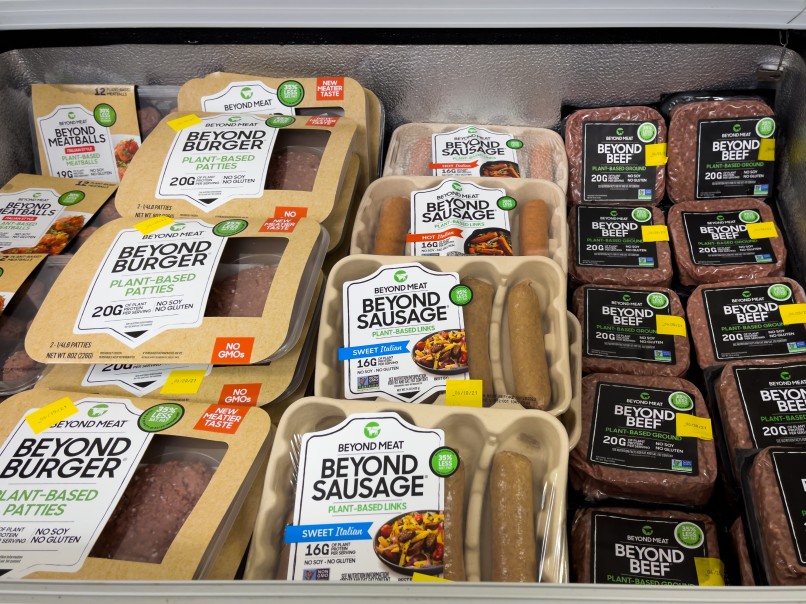
All our food is suddenly becoming plant-based. Plant-based meat already is here and plant-based bacon is becoming widely accepted. Now plant-based tuna fish is available as is egg made with mung beans. The momentum to plant-based food is soaring as more and more consumers switch out of eating foods that are animal-based, including red meat, dairy products, chicken, pork, eggs and even fish.
Sales of plant-based meat are expected to reach more than $29 billion in 2031. Among the reasons for the switch in consumer tastes are that animal products are considered less healthy and are damaging to the environment whereas plant-based foods are sustainable and nutritious.
Read More »It seems that everywhere you look in the grocery store these days another plant-based food pops up and demands your attention.
The trend to plant-based foods has been around for a while, but now the momentum is soaring as an increasing number of consumers are switching out of eating food that is animal-based, including red meat, dairy products, chicken, pork, eggs and now even fish.
Until recently, no real direct alternatives existed for animal-based food. Vegetarians and vegans simply did without it. The new generation of plant-based products are aimed at 95 percent of meat eaters who want to cut down on their meat eating for environmental or health reasons, according to technology research company IDTechEx.
Plant extracts are also being used increasingly in beverage and food products as well in dietary supplements. The move is reflected in the investments in the plant extracts market, which catapulted to $30.8 billion in 2021 and is expected to reach $55.3 billion in 2026, according to MarketsandMarkets, an online research company.
Reasons behind the trend
Several reasons lie behind this sudden significant shift in consumer consumption.
• Animal products are considered less healthy than those that are plant-based.
Regular consumption of red meat has been linked to increasing chronic disease and heart ailments, such as strokes and even death. A large intake of processed meat, such as bacon, has been associated with various forms of cancer, particularly those associated with lung cancer, breast cancer, and colon cancer.
Processed meat also has been linked with diabetes.
• The disruption to the meat supply system as a result of COVID-19 placed the industry under growing scrutiny.
Conditions in the meat packing plants revealed as a result of the spread of the virus in the meat packing plants gave some people second thoughts about eating meat.
• An increasing number of people are becoming allergic to animal products.
A possible reason is the use of hormones and antibiotics fed to the animals.
• The raising of animals, particularly cattle, is considered more damaging to the environment than the growing of plants.
• Plant-based foods are seen as more nutritious than those that are animal-based.
Fortified foods made from plants are regarded as being of help to those suffering from deficiencies in nutrition. Proponents say supplements derived from plants provide nutrients that the body needs. They also are said to boost the body’s immune system.
Plant-based meat
Sales of plant-based meat, such as Beyond Burger and Impossible Burger, are growing strongly around the world.
A newcomer is Future Farm, a Brazilian company that has operations around the world. The company is trying to break into the U.S. market with its Future Burger, Future Sausage, Future Meatballs and Future Beef. The products are made with peas, chickpeas, non-GMO soy and other whole food ingredients.
Future Farm’s CEO Alexandre Ruberti says the company aims at cutting back on animal protein and creating a future in which people will want to live.
The plant-based meat industry raised more than $1.4 billion in 2020, according to IDTechEx, which predicts that the market will be valued at more than $29 billion in 10 years.
Plant-based bacon
A number of plant-based bacon alternatives are on the market. Among those recently introduced is plant-based bacon produced by San Francisco-based Hooray Foods.
The company was founded in 2019 by Sri Artham in the wake of growing environmental disasters such as the wildfires in California. He combined his desire to improve the environment with 10 years of experience working in the sustainable food industry.
The plant-based bacon was introduced in 300 Whole Foods across the country and is expanding, the company says. Hooray Foods is working on meeting demand from leading national grocery and retail chains as well as developing improved versions of its plant-based bacon as well as other products.
The company’s bacon alternative includes 20 percent fat in the form of coconut oil, which it allows to sizzle so that it smells and tastes like bacon. Other ingredients include tapioca starch, rich flour, umami seasoning, liquid smoke, salt, maple syrup and beet juice concentrate.
The company adds that it places the environment, health and the welfare of animals in the front of its business, resulting in cutting carbon emissions by more than 80 percent. The bacon is free of soy, gluten, nitrites and hormones.
Plant-based tuna
Plant-based tuna has been launched by food technology company Kuleana which says its mission is to recreate tasty, nutrient-rich, and sustainable seafood from plants. The tuna will be served at its Poké Bar restaurants across North America.
The company says its tuna has been developed for those consumers who are concerned about their health and the issue of environmental sustainability.
The tuna is almost indistinguishable in texture, taste and presentation from the version that is caught in the ocean, says Jacek Prus, co-founder and CEO of Kuleana. It shows the increasing demand for protein alternatives that are plant based, he adds.
The tuna is rich in omega-3 DHA, iron and vitamin B12, the company says, but it is made entirely from plants, including radish, algae and bamboo fiber. It is free of cholesterol and contains only 5 grams of fat, making it similar to an ocean-caught or farmed tuna.
Plant-based egg
Egg made from mung beans has been produced by JUST Egg. The company says that the plant-based egg, which is rich in protein, has no cholesterol and contains a lower amount of saturated fat than hens’ eggs.
Producing the egg substitute requires less water, land and carbon emissions to produce. So much so that it is among the sources of protein that are most sustainable, the company adds





